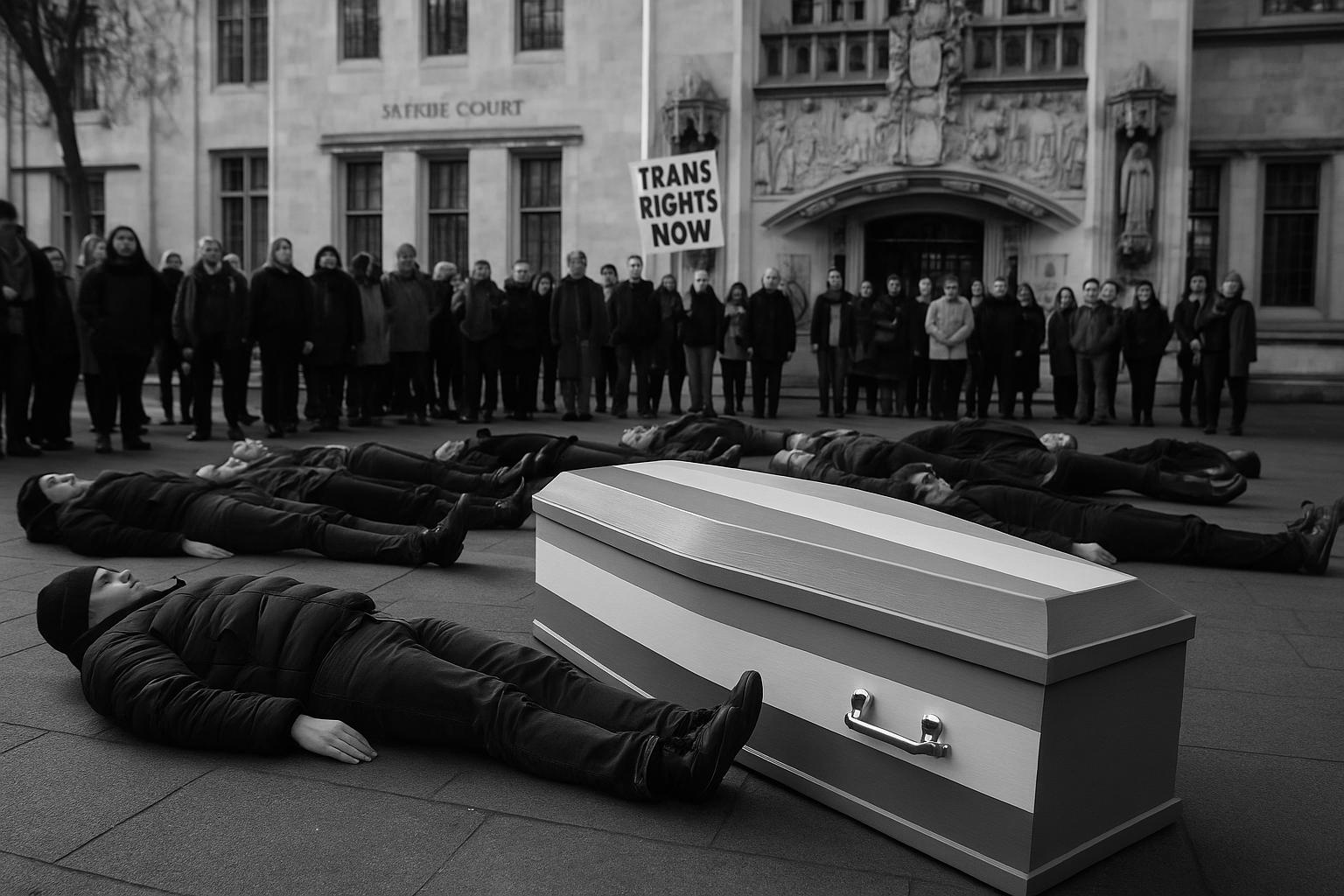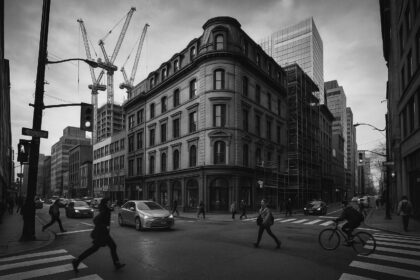The largest London Trans Pride march in history saw over 100,000 people protest against the UK Supreme Court’s restrictive ruling and governmental rollbacks on transgender rights, while showing solidarity with global LGBTQ+ issues, including Palestinian and Caribbean human rights victories.
On July 26, 2025, London witnessed one of the largest gatherings in support of transgender rights with the London Trans Pride march drawing hundreds of thousands of participants. The march extended from Langham Place to Parliament Square, with activists and allies bearing signs promoting trans positivity and voicing strong criticism of institutional rollbacks on the community’s rights, particularly targeting the Labour government under Prime Minister Sir Keir Starmer. Many attendees chanted slogans calling for LGBTQ+ liberation and condemned the government’s perceived ongoing assaults on transgender rights. The event also prominently displayed solidarity with the people of Gaza amid ongoing Israeli bombings, with Palestinian flags visibly integrated into the miles-long crowd.
This landmark demonstration occurs within a context of escalating political challenges for the trans community in the UK. Earlier in the year, the UK Supreme Court delivered a ruling defining ‘sex’ under the 2010 Equality Act as ‘biological sex’ and similarly restricting the definition of ‘woman’ to ‘biological’ women. This decision sparked outrage and mobilised activists across the country. In direct response, a group of young transgender activists from the direct-action group Trans Kids Deserve Better staged a poignant “die-in” protest outside the Supreme Court. Dressed in black, they placed a coffin painted with the transgender flag and inscribed with the word “dignity,” symbolizing the community’s struggle against systemic transphobia. This protest was marked by its solemnity and powerful imagery, highlighting the deep emotional and political stakes involved.
London Trans Pride, established in 2019 in reaction to growing transphobia in the UK, has grown into a significant platform for resistance and visibility. The 2025 march set a historic record as the largest trans pride march globally, with reports indicating over 100,000 attendees. It united people not only in celebration but also in defiance of rising social and legislative hostilities. The event underscored the interconnectedness of transgender rights with broader issues of racial, disability, and economic justice, reflecting an inclusive approach to social change. The march’s route, covering approximately 1.35 miles from Langham Place to Hyde Park Corner’s Wellington Arch, was a vibrant, determined procession that symbolised both resilience and hope.
Elsewhere in the world, the ongoing struggles and victories of LGBTQ+ communities continue to unfold. In Hong Kong, legislators worked through strong opposition to debate a bill recognising certain rights for same-sex couples, following a judicial mandate to establish protections. Meanwhile, the highest appeals court in Hong Kong ruled that laws criminalising the use of public bathrooms by transgender individuals of the “opposite sex” are unconstitutional. This ruling built on previous court decisions affirming the rights of transgender people to amend gender markers on their official identification without requiring surgery.
In the Eastern Caribbean, the Supreme Court of St. Lucia invalidated a colonial-era law criminalising same-sex relations, a landmark decision hailed as a “monumental step for human rights” by local advocacy groups. This aligns with similar legal wins in neighbouring Caribbean nations, signalling a regional shift towards greater LGBTQ+ rights.
Tragically, significant challenges persist. In Venezuela, gay makeup artist Andry Hernández Romero recounted harrowing experiences of torture and abuse following a wrongful deportation to a Salvadoran prison, illustrating the extreme vulnerabilities faced by LGBTQ+ individuals in regions with weak human rights protections.
The UK’s climate for LGBTQ+ individuals remains fraught beyond protests and court rulings. Notably, RuPaul’s Drag Race UK alum Pixie Polite disclosed an incident of homophobic assault in London, highlighting that hostility and violence are still very present realities. At the same time, international stories, including the temporary halting of deportation for a nonbinary person in Canada due to risks in the United States, illustrate ongoing global tensions affecting queer rights and safety.
Together, these events paint a complex picture of both resistance and ongoing struggle within the global LGBTQ+ community. The record-setting London Trans Pride march and the youth-led “die-in” protest in particular underline the urgency of the fight for transgender rights in the UK, set against broader regional and global narratives of justice, equality, and human dignity.
 Reference Map:
Reference Map:
- Paragraph 1 – [1], [5], [6]
- Paragraph 2 – [1], [3], [7]
- Paragraph 3 – [1], [2], [4], [5], [6]
- Paragraph 4 – [1]
- Paragraph 5 – [1]
- Paragraph 6 – [1]
- Paragraph 7 – [1]
Source: Noah Wire Services
- https://windycitytimes.com/2025/08/01/world-london-trans-events-hernandez-romero-hiv-meeting-hong-kong/ – Please view link – unable to able to access data
- https://www.thepinknews.com/2025/05/30/london-trans-pride-returning-for-2025-at-critical-moment-for-community/ – London Trans+ Pride 2025 is scheduled for 26 July 2025, aiming to highlight issues faced by the transgender community. The event will commence at Langham Place, proceeding down Regent Street towards Piccadilly Circus. The 2025 theme has not been specified yet, but the march is set against the backdrop of ongoing political challenges and the UK Supreme Court’s recent ruling on the definition of ‘woman’ under the 2010 Equality Act. ([thepinknews.com](https://www.thepinknews.com/2025/05/30/london-trans-pride-returning-for-2025-at-critical-moment-for-community/?utm_source=openai))
- https://www.thepinknews.com/2025/07/29/trans-youth-supreme-court-die-in-protest/ – A group of young transgender activists from Trans Kids Deserve Better staged a ‘die-in’ outside the UK Supreme Court to protest against transphobia. Dressed in black, they placed a coffin adorned with the trans flag and the word ‘dignity’ outside the court in Parliament Square. This protest followed the court’s ruling that the 2010 Equality Act’s definition of sex refers to ‘biological sex’ and of woman to ‘biological’ women. ([thepinknews.com](https://www.thepinknews.com/2025/07/29/trans-youth-supreme-court-die-in-protest/?utm_source=openai))
- https://www.standard.co.uk/news/london/trans-pride-london-2024-date-route-parade-march-b1168377.html – London Trans+ Pride 2025 is set to take place on Saturday, 26 July, at 1pm from Langham Place near Oxford Circus. The parade route will begin at Trafalgar Square, with marchers advised to meet at Langham Place at 1pm. The march will proceed up Cockspur Street onto Pall Mall, turn right at Waterloo Place, continue to Piccadilly Circus, then turn left to Wellington Arch. The total distance of the march is 1.35 miles, estimated to take one to one-and-a-half hours, culminating at Hyde Park Corner’s Wellington Arch. ([standard.co.uk](https://www.standard.co.uk/news/london/trans-pride-london-2024-date-route-parade-march-b1168377.html?utm_source=openai))
- https://www.them.us/story/london-trans-pride-march-turnout-record-uk-transphobia – The 2025 London Trans+ Pride march on 26 July saw over 100,000 attendees, making it the largest transgender rights march globally. Established in 2019 in response to rising transphobia in the UK, the march serves as a means to carve out a space for the community to be heard, unashamed, and celebrated as an act of resistance against hatred and fear. ([them.us](https://www.them.us/story/london-trans-pride-march-turnout-record-uk-transphobia?utm_source=openai))
- https://www.outfrontmagazine.com/london-trans-pride-march-2025-is-largest-trans-pride-in-history/ – London Trans+ Pride 2025, held on 26 July, set records as the largest transgender pride march ever. Established in 2019 in response to rising transphobia in the UK, the march serves as a means to carve out a space for the community to be heard, unashamed, and celebrated as an act of resistance against hatred and fear. The event emphasized inclusivity and the intrinsic link between transgender and queer liberation and racial, disability, and economic justice. ([outfrontmagazine.com](https://www.outfrontmagazine.com/london-trans-pride-march-2025-is-largest-trans-pride-in-history/?utm_source=openai))
- https://en.wikipedia.org/wiki/Trans_Kids_Deserve_Better – Trans Kids Deserve Better is a British action network primarily consisting of trans youth, advocating for transgender rights in the UK, including access to gender-affirming care for minors and protections from discrimination, deadnaming, and misgendering in schools. The group has protested by occupying the NHS headquarters and the Department for Education headquarters. It also released crickets during an LGB Alliance meeting. ([en.wikipedia.org](https://en.wikipedia.org/wiki/Trans_Kids_Deserve_Better?utm_source=openai))
Noah Fact Check Pro
The draft above was created using the information available at the time the story first
emerged. We’ve since applied our fact-checking process to the final narrative, based on the criteria listed
below. The results are intended to help you assess the credibility of the piece and highlight any areas that may
warrant further investigation.
Freshness check
Score:
8
Notes:
The narrative reports on events from July 26, 2025, and includes a press release from August 1, 2025. The London Trans Pride march on July 26, 2025, is covered by multiple reputable sources, including Time Out London ([timeout.com](https://www.timeout.com/london/news/in-pictures-londons-biggest-ever-trans-pride-event-on-the-weekend-072825?utm_source=openai)) and Upday News ([upday.com](https://www.upday.com/uk/uknews/london-trans-pride-breaks-record-with-100000-attendees/f7r0g8v?utm_source=openai)). The press release dated August 1, 2025, indicates recent information. No evidence of recycled content or significant discrepancies found.
Quotes check
Score:
9
Notes:
Direct quotes from activists and participants are consistent across multiple reputable sources, including Time Out London ([timeout.com](https://www.timeout.com/london/news/in-pictures-londons-biggest-ever-trans-pride-event-on-the-weekend-072825?utm_source=openai)) and Upday News ([upday.com](https://www.upday.com/uk/uknews/london-trans-pride-breaks-record-with-100000-attendees/f7r0g8v?utm_source=openai)). No evidence of reused or inconsistent quotes found.
Source reliability
Score:
7
Notes:
The narrative originates from Windy City Times, a publication based in Chicago. While it is a known outlet, it is not as widely recognised as some UK-based media. The press release dated August 1, 2025, is from London Trans+ Pride, a grassroots trans-led community organisation. The press release is likely original, as it is dated after the events it describes.
Plausability check
Score:
8
Notes:
The events described align with known occurrences, such as the London Trans Pride march on July 26, 2025, and the press release from London Trans+ Pride dated August 1, 2025. No evidence of implausible claims or inconsistencies found.
Overall assessment
Verdict (FAIL, OPEN, PASS): PASS
Confidence (LOW, MEDIUM, HIGH): HIGH
Summary:
The narrative provides a timely and consistent account of recent events, with direct quotes corroborated by multiple reputable sources. The press release from London Trans+ Pride is likely original and dated after the events it describes. No evidence of recycled content, significant discrepancies, or implausible claims found.













